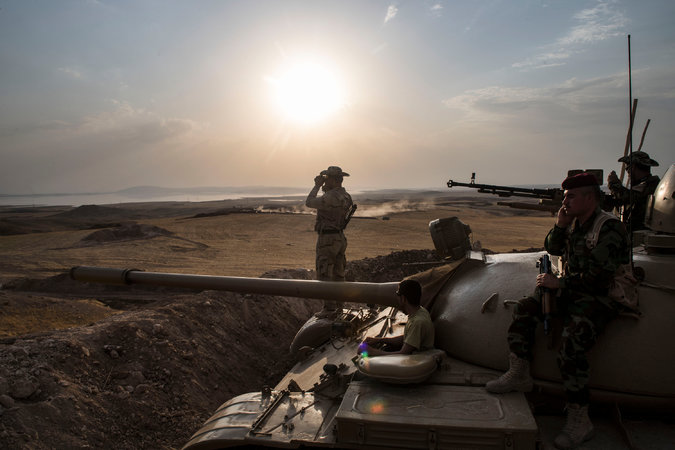What motivates U.S. imperialism is not the protection of Yazidis, Iraqi Christians, the Kurdish population, or the Iraqi Muslims of Shiite or Sunni sects that the I.S. threatens. Only Washington’s energy interests are what motivate Pentagon intervention.

Kurdish pesh merga fighters near the Mosul Dam on Monday. President Obama said Iraqi and Kurdish forces quickly took advantage of American airstrikes. Credit Lynsey Addario for The New York Times
Aug. 18 — This morning the Iraqi government forces claimed they had retaken control of the Mosul Dam in northern Iraq from the Islamic State fighters. The Iraqi army is reportedly fighting in alliance with the Peshmerga, the army of the authorities in the Kurdish area of Iraq known as Iraqi Kurdistan, as U.S. drones, jets and bombers strike I.S. targets from the air. The I.S. denies losing control of the dam. (BBC, Aug. 18)
It has become apparent that despite denials from U.S. spokespersons, and including President Barack Obama himself, Washington has reopened its direct military intervention in Iraq, including the potential use of U.S. ground forces. British and French intervention is unlikely to be far behind.
The U.S. bombed mostly trucks, armored vehicles and weapons that the U.S. had supplied the Iraqi army, which were then captured by the I.S. in the uprising that took the city of Mosul in June.
Washington and its European allies — especially the major imperialist countries: Britain, France and Germany — have been sending weapons and/or trucks directly to the Iraqi Kurdistan military for the past week. British warplanes are flying attack missions. The U.S. sent aid directly to the Kurdish regime rather than the national government in Baghdad, apparently to pressure Iraqi Premier Nouri al-Maliki to resign, which he did on Aug. 15. Washington had backed Maliki’s rise to power, but he alienated most of the Iraqi population and outlived his usefulness to imperialism.
The Obama administration has dropped almost all pretense that the “humanitarian” rescue of the Yazidis from Mount Sinjar — a mountain range near Iraq’s border with Syria — is anything but a pretext. A U.S. military mission to Mount Sinjar reported that there were not so many people there after all and the U.S. would not send in a rescue mission. Yazidi spokespeople said there are still thousands in the mountains.
Neither U.S. forces nor the Peshmerga led tens of thousands of Yazidis off the mountain. Two Kurdish guerrilla armies did. These are the fighters of the Kurdistan Workers Party (PKK), a revolutionary socialist group fighting against Turkey for self-determination, and of the Syrian People’s Defense Units (YPG), which have been fighting I.S. and related forces in Syria.
Washington and Brussels define the PKK as a “terrorist” organization. Nevertheless, the Aug. 18 Wall Street Journal reported that PKK officials said they held discussions with U.S. officials about the fight against the I.S. in Iraq. As of Aug. 18, U.S. officers deny holding these talks and the U.S. and European Union refuse to remove the PKK from the “terrorist” list.
As we have made clear in earlier articles, Washington has had an ambivalent relation with al-Qaida and its offshoot, the I.S. In Afghanistan in the 1980s, in Libya and in Syria, the U.S. and its allies in NATO and the Arab monarchies in Saudi Arabia and the Gulf Emirates have funded and armed these narrow, reactionary forces to weaken or destroy governments that have opposed imperialist interests. The U.S. also uses the “terrorist” threat to mobilize the U.S. population to support military interventions.
Imperialist interests in Iraq
With the confusing mix of forces in play, it helps to bring up a quote from an imperialist politician from an earlier era, British Premier Benjamin Disraeli, who said: “We have no permanent friends. We have no permanent enemies. We just have permanent interests.”
So too has U.S. imperialism. Under the George W. Bush administration, the U.S. invaded Iraq in 2003 to gain strategic control of Iraq’s energy resources, as under the Obama administration the U.S. bombed and sabotaged the Libyan government. Its interventions have failed to establish stable puppet regimes and, while U.S. interventions took oil and gas out of the hands of sovereign states and cut energy production, it left these resources outside firm imperialist control.
The Iraqi Kurdistan regime is composed of parties that have been cooperating with the CIA since the 1970s. The Kurdish-based regime in northern Iraq is currently the only stable U.S. client in the country. With about a third of Iraq’s oil reserves, the Kurdish region of Iraq has become the center of Western investment and its capital, Erbil, has attracted imperialist consulates as large as their embassies in Baghdad.
Reports indicate that the 200,000 barrels of oil produced daily in Iraqi Kurdistan will reach 250,000 next year. Obama told the New York Times’ Tom Friedman in an Aug. 8 interview: “The Kurdish region is functional in the way we would like to see. … So we do think it is important to make sure that that space is protected.”
What motivates U.S. imperialism is not the protection of Yazidis, Iraqi Christians, the Kurdish population, or the Iraqi Muslims of Shiite or Sunni sects that the I.S. threatens. Only Washington’s energy interests are what motivate Pentagon intervention.
These interests benefit only a narrow sector of the U.S. superrich bankers and owners of the oil monopolies. U.S. workers and the poor of all nationalities, who may be called on again to be the killers and cannon fodder in a war that threatens all Iraqis, don’t share these interests.
Right now, U.S. airstrikes are blowing up U.S. armor captured by the I.S. While this is an ideal situation for the profits of the military-industrial complex, the Pentagon generals know it won’t establish U.S. control of Iraq. However much Obama promises “no troops on the ground,” everything points to a renewed military intervention by U.S. troops.
Find more like this: Anti-war, Around the world , Iraqi Kurdistan,PKK, President Barack Obama, Syrian People

No comments:
Post a Comment